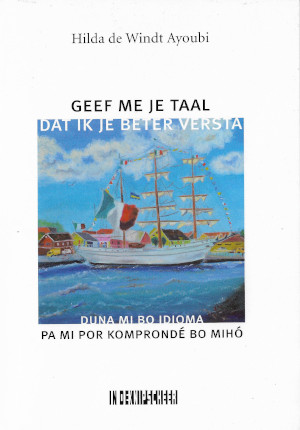| Kaz | Enfo | Ayiti | Litérati | KAPES | Kont | Fowòm | Lyannaj | Pwèm | Plan |
| Accueil | Actualité | Haïti | Bibliographie | CAPES | Contes | Forum | Liens | Poèmes | Sommaire |
Duna mi bo idioma pa mi Geef me je taal dat ik
|
 |
A translation of the description of her last book by the Publisher (In de Knipscheer), Duna mi bo idioma pa mi komprondé bo mihó, Give me your language that I can understand you better, September, 2019, In de Knipscheer, the Netherlands.
Language is everything for Hilda de Windt Ayoubi. As a child of Lebanese parents, she grew up in Curaçao. Nonetheless, she calls herself "illiterate in Lebanese." She is particularly fond of "minority languages" such as Papiamentu. Her interest in bilingualism, multilingualism, code switching, , language contact, media language, and the social and emotional implications of the preservation or loss of native languages formed the basis for this impressive, partly bilingual poetry collection. Give me your language. That I understand you better is an ode to language and to those who are committed to it. In particular the two linguists who meant a lot to Papiamentu: Frank Martinus Arion and, also for other native languages, Pieter Muysken. Arion who founded the first school with Papiamentu as the language of instruction, Muysken who saved many indigenous languages of South America from ruin by researching and registering them.
The bundle consists of three parts: "Language never stands still" ('Taal staat nooit stil'), in which the poems deal with the importance of language and the preservation of, in particular, the small languages; 'Wound and balm ('Wond en Balsem')', the part that deals with Arion's life, his poetry and his novel Dubbelspel, Muyskens preserving numerous Indian, South African and Creole languages of Suriname and his contribution to the Papiamentu of the Leeward Islands, and 'Papiamentu for always' ('Papiamentu pa Semper), the almost self-evident end piece of this collection in bilingual poems: Duna mi bo idioma. Pa mi por komprondé bo mihó.
The book also contains a bibliography and a large part with notes. "A language is not dead, a language lives, grows, takes over from other languages, lends to other languages. Although every language has rules, nothing can stop this natural process, "Hilda de Windt learned Ayoubi from Arion and Muysken. That she has taken their wise words to heart is evident from this impressive collection of poems: The person who helps to preserve the language and culture of minorities also helps to revive world peace. conservation also helps with the revival of world peace.
She presented the book in Amsterdam, at Podium Mozaiek, September 8, 2020, and on her island Curacao, December 10, 2020, on The International Day of Human Rights. Very soon she will present the book on our sister island, Aruba.
*
